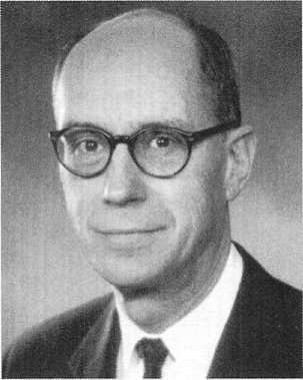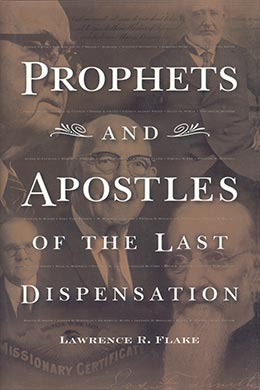Henry Bennion Eyring
Lawrence R. Flake, Prophets and Apostles of the Last Dispensation (Provo, UT: Religious Studies Center, Brigham Young University, 2001), 559–62.

Born: 31 May 1933, Princeton, New Jersey
First counselor to presiding bishop Robert D. Hales: 6 April 1985
First Quorum of the Seventy: 3 October 1992
Quorum of the Twelve Apostles: 1 April 1995 (age 61)
Even though Elder Henry B. Eyring was raised far from the headquarters of the Church, he could make the claim that he had a 100-percent attendance record in Primary. This was simple for him because Primary was only held once in the branch he attended when his family lived in Princeton, New Jersey. It was held in a sort of lodge hall. He remembered the green felt of the pool table and even what the lesson was about. It “must have been about the pioneers,” he recalled, “because I remember seeing a little clay model of a wagon train placed on the green table.” [1] His father, Henry Eyring, a world-renowned chemist, was a professor at Princeton University. His mother, Mildred Bennion Eyring, was a doctoral candidate and acting chair of her department at the University of Utah when she met her husband. During World War II, when gas rationing prevented the family from making the seventeen-mile trip to where the small New Brunswick Branch had been meeting, the Eyring family held Church meetings in their own home. The only other people to meet with them were students, older people, and servicemen. Elder Eyring said, “There was never, that I remember, another family in the branch. I think you’d be probably pressing it to say there were ever more than 20 people.” [2] Another of Elder Eyring’s early memories of the Church was of a district conference where he received a strong witness of the Spirit while a “tall, thin man” was speaking. “I do not know what he was speaking about, but an absolutely powerful experience came to me that he was a servant of God and that he was speaking the truth.” [3]
When Elder Eyring was in his early teens, his father accepted a position to teach at the University of Utah and moved the family to Salt Lake City, where Elder Eyring graduated from East High School and entered the University of Utah. After completing a bachelor’s degree in physics, he served for two years in the Air Force in Albuquerque, New Mexico. He next obtained an MBA at Harvard, where he met his future wife, Kathleen Johnson, a graduate of the University of California at Berkeley, who was attending summer school at Harvard. He was serving in the Boston district presidency. From 1962 to 1971 he was an associate professor in the Graduate School of Business at Stanford University. He had the opportunity of returning to Cambridge, Massachusetts, during this time (1964 to 1965) as a visiting faculty fellow. After living nine years in the comfortable Palo Alto area where everything in their life seemed to be ideal, Sister Eyring felt inspired to ask her husband, “Are you sure you are doing the right thing with your life?” [4]
They began to pray and reflect deeply on their goals. Within just a few weeks, Elder Eyring was out of secular employment for the rest of his life. He was asked to accept an appointment as president of Ricks College. From that assignment he was recruited for the important position of deputy commissioner of Church Education, and later he became Commissioner of Education. He moved directly from his employment in Church Education to become a general authority of the Church, being called to serve in the full-time position as a counselor in the Presiding Bishopric. In 1992 he became a member of the First Quorum of the Seventy and in 1995, a member of the Quorum of the Twelve Apostles.
The Eyrings have four sons and two daughters. The children were raised with not just one regular weekly family time set aside, but two. In addition to Monday nights for Family Home Evening, Elder and Sister Eyring always expected their children to keep their Saturday mornings open for a family “project,” which could mean cleaning the garage, planting flowers, or even simply carving wood together. In the tradition of his own father, Elder Eyring helped his children with their math or science problems by making sure they understood the basics behind the complex figures. He approached the leadership of his family in the same manner. “Family relationships are very complicated. . . . You can’t hope to read every social science book ever written. . . . The only way you will be effective is to have a few true principles in your heart that you hold deeply, and to act out of them.” [5]
His strong testimony also reflects the simple and powerful basics of the gospel of Jesus Christ. When he was called to the apostleship in 1995, he said, “The only way to peace in this life and eternal life in the world to come is the Savior Jesus Christ, and to endure and be faithful.” [6] In his general conference address delivered the day he was sustained he said, “I will keep my covenant to take his name upon me and always remember him. And I will go wherever I am sent to teach of him.” [7]
Notes
[1] Gerry Avant, “Presiding Bishop’s First Counselor is Strictly a ‘Back to Basics’ Kind of Man,” Church News, 7 July 1985, 4.
[2] Julie A. Dockstader, “‘Charity Never Faileth’ Scripture a Foundation for New Apostle’s Life,” Church News, 15 April 1995, 6.
[3] Dockstader, “‘Charity Never Faileth,’” 6.
[4] Dockstader, “‘Charity Never Faileth,’” 7.
[5] Avant, “Presiding Bishop’s First Counselor,” 4.
[6] Dockstader, “‘Charity Never Faileth,’” 7.
[7] Conference Report, 1 April 1995, 33.
